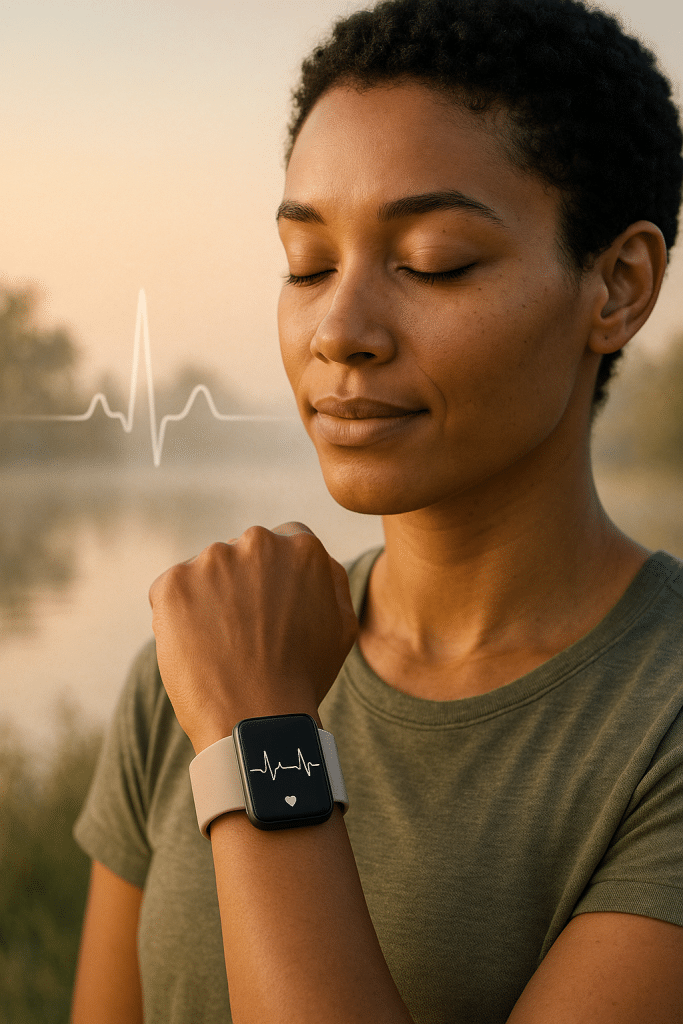When it comes to managing stress and maintaining emotional balance, understanding our heart’s signals plays a crucial role. This is where wearable ECG monitors step into the picture, offering a remarkable blend of technology, health insights, and mindfulness support. These devices do more than simply track your heart rhythm – they provide real-time data, biofeedback, and tailored insights that promote wellness and alleviate anxiety. Whether you’re a wellness enthusiast, someone seeking reliable stress relief tools, or simply curious about heart health, wearable ECG monitors can be transformative allies on your journey.
In this comprehensive article, I’ll walk you through everything you need to know about wearable ECG monitors from a wellness perspective. We’ll explore how these compact devices work, the science behind heart monitoring and stress management, and dive deep into top industry-leading products like CardioRTHM by Movesense, P-CARDIO’s range, Wellue DuoEK™, Frontier X2, and Welch Allyn TAGecg™. I’ll also unpack how these monitors integrate with mindfulness apps, their Bluetooth connectivity, and the cutting-edge AI algorithms that deliver personalized stress insights.
By the end, you’ll not only understand the powerful benefits these ECG wearables bring but also learn practical ways to choose and use them effectively to maintain a balanced, stress-free lifestyle. So, let’s get started on this heart-smart wellness journey that truly puts your well-being first.
Understanding Wearable ECG Monitors: A Wellness Perspective
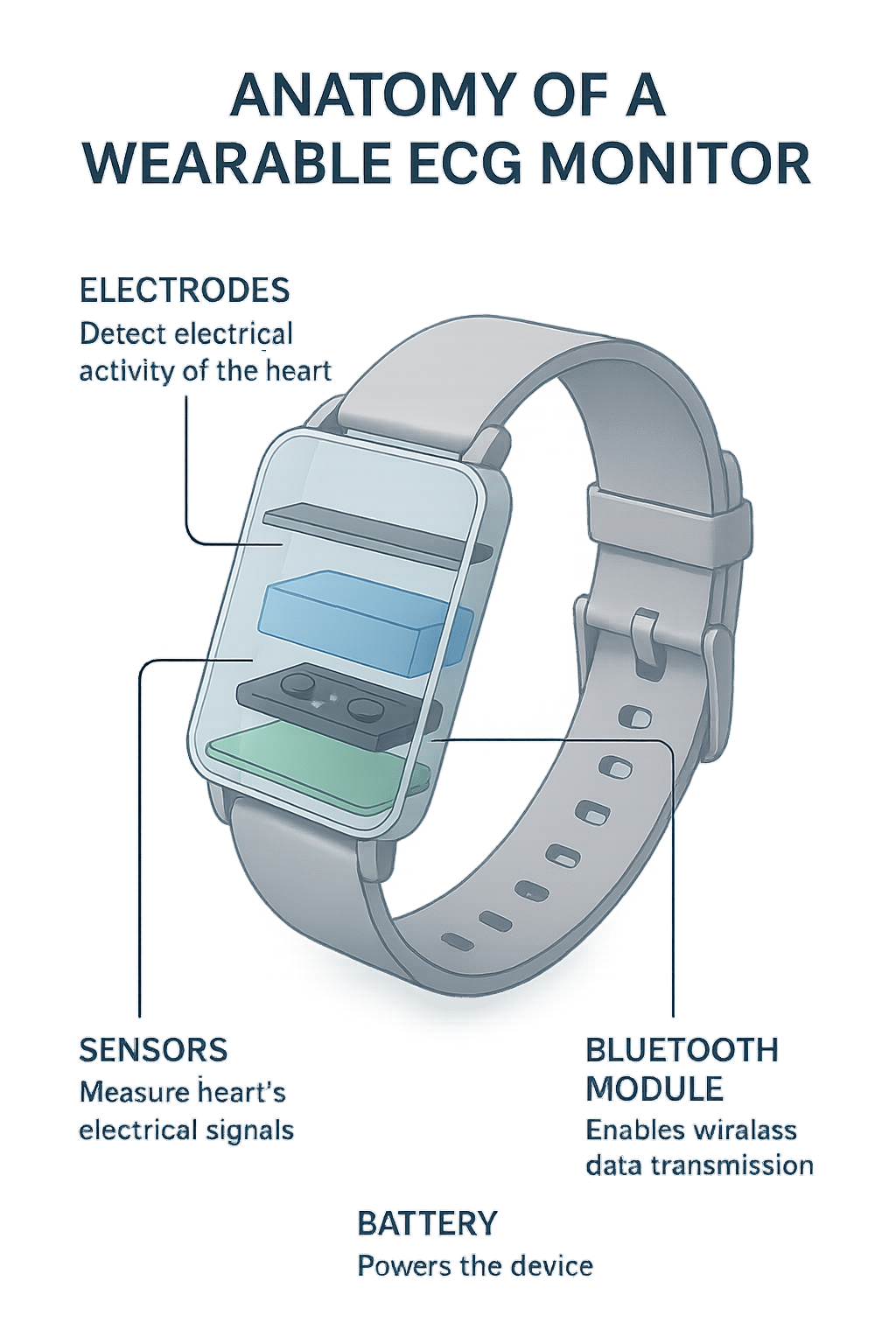
What Is a Wearable ECG Monitor?
A wearable ECG monitor is a compact, often lightweight device designed to continuously or intermittently record the heart’s electrical activity in everyday settings. Unlike traditional bulky medical Holter monitors, these devices are designed for comfort, ease of use, and seamless integration into daily life. They capture heart rhythms via sensors placed on or near your skin, translating electrical signals from the heart into data you can track in real time or review later.
For wellness-focused individuals like us, wearable ECG monitors mean being empowered with insights that go beyond step counts or simple heart rate — these devices capture the nuances of your heart rhythm and heart rate variability (HRV). This granular data provides a window into your autonomic nervous system, showing how stress, relaxation, and various lifestyle activities impact your emotional and physiological balance.
Take the CardioRTHM by Movesense, for instance. It uses a wearable sensor paired with a chest strap, and a mobile app enables continuous rhythm assessment and heart rate monitoring, perfectly tailored for those wanting to manage their stress proactively. Similarly, the Wellue DuoEK™ offers a portable, AI-powered ECG option for on-the-go measurement and instant heart health insights, making it accessible and practical.
How Wearable ECG Monitors Track Heart Activity Continuously
Continuous heart monitoring is a game changer for wellness because it captures heart dynamics throughout all phases of your day — in rest, exercise, and moments of stress or relaxation. The technology inside these devices involves sensors measuring the tiny electrical signals generated by your heart as it beats, usually through single-lead or multi-lead ECG sensors.
Single-lead devices track heart rhythm from a single vantage point—ideal for daily stress management and basic arrhythmia monitoring. Multi-lead sensors (like those offered by P-CARDIO’s HP202 and HP208 models) provide more comprehensive data, capturing the heart’s activity from multiple angles, mimicking clinical ECGs but in a much more portable format.
Continuous recording—possible for days or weeks depending on the product—means these wearables don’t miss subtle shifts related to anxiety spikes, stressful events, or the calming effects of meditation. Data can be stored, synced via Bluetooth, and presented to users or even healthcare professionals for deeper insights.
Single-Lead vs Multi-Lead Sensors: What Wellness Seekers Need to Know
For anyone eyeing wearable ECG monitors for stress relief and wellness, understanding the sensor leads is key:
-
Single-Lead Monitors: These devices, like the Movesense MD Sensor in CardioRTHM or the Wellue DuoEK™, offer simplicity and portability. They’re excellent for tracking heart rate variability and detecting common stress patterns or irregular heartbeats. They’re less intrusive and typically more affordable, making them perfect for daily wellbeing applications.
-
Multi-Lead Monitors: Devices such as the P-CARDIO HP202 (6-lead) or HP208 prototype (12-lead) provide detailed cardiac mapping. Though mainly for clinical research and sophisticated cardiac monitoring, they deliver richer data sets valuable for those with complex heart health needs or integrating comprehensive wearables into long-term wellness strategies.
For stress management specifically, single-lead monitors generally suffice, providing real-time feedback that guides mindfulness, relaxation, and emotional balance practices effectively.
Key Stress-Relief Mechanisms Enabled by Wearable ECG Technologies
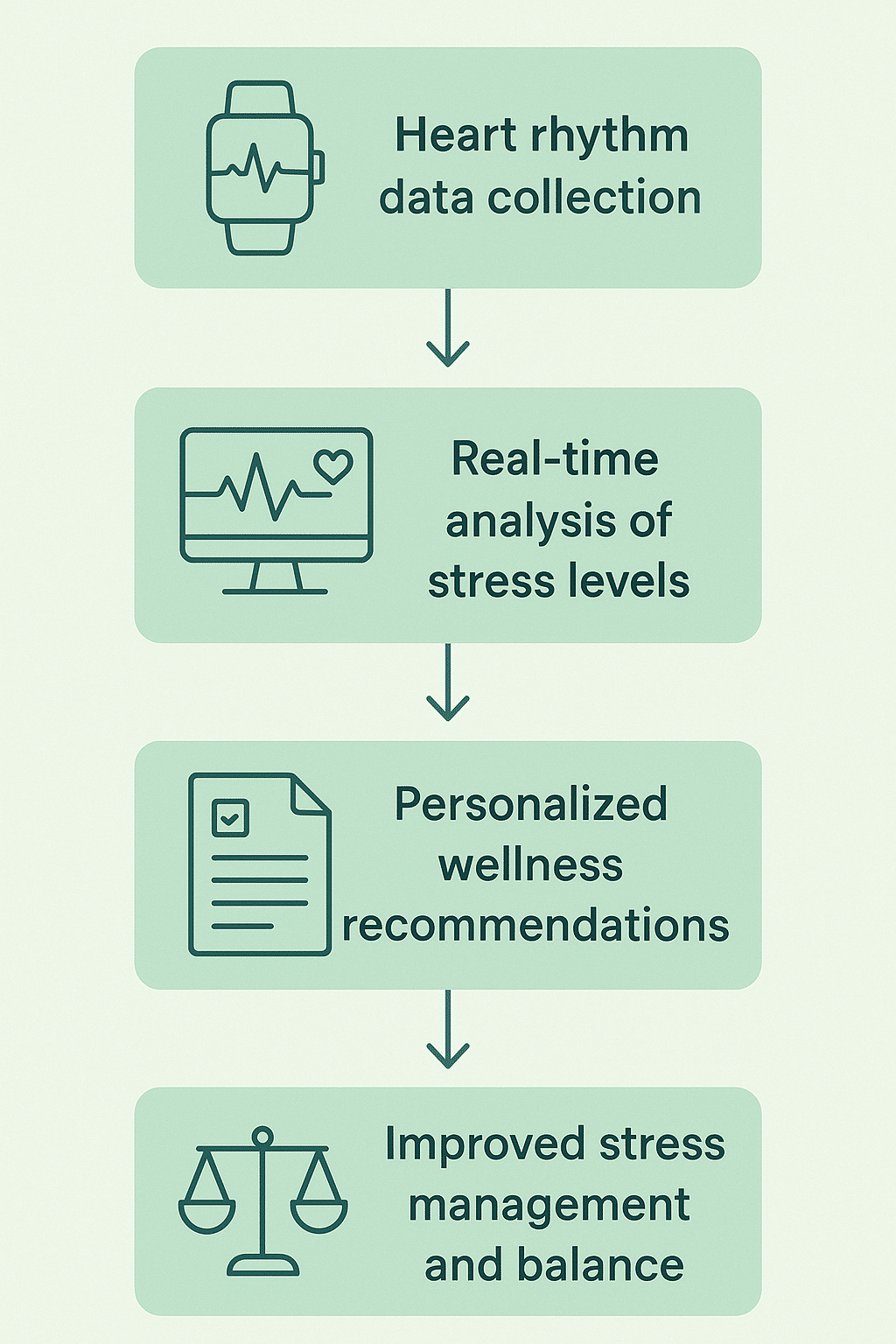
Heart Rate Variability (HRV) and Its Role in Emotional Balance
One of the scientifically proven benefits that wearable ECG monitors bring to the wellness table is monitoring Heart Rate Variability (HRV) — the subtle fluctuations in time intervals between your heartbeats. HRV is a powerful stress biomarker, reflecting the dynamic interplay between your sympathetic (fight or flight) and parasympathetic (rest and digest) nervous systems.
Higher HRV often indicates greater resilience and relaxation capacity, while low HRV suggests chronic stress or anxiety. By consistently measuring HRV, devices like the Fourth Frontier X2 Smart Heart Monitor provide insights on your emotional balance status, stress load, and recovery needs.
Monitoring your HRV allows you to understand when your body is stressed or relaxed and guides you toward lifestyle choices or mindfulness practices that promote calm. For example, noticing HRV dips before stressful meetings can prompt a quick meditation or breathing exercise to restore equilibrium.
Real-Time Biofeedback for Mindfulness and Anxiety Management
Here’s a neat trick wearable ECG monitors offer: real-time biofeedback. Imagine having your very own stress coach on your wrist or chest that immediately reacts to your heart’s activity. That’s what real-time ECG monitoring combined with supportive apps provides.
When stress or anxiety triggers heart rate spikes or irregular patterns, your device can alert you instantly with vibration or app notifications. This immediate feedback nudges you to use relaxation techniques — like deep breathing, progressive muscle relaxation, or mindfulness meditation — just as your body needs it.
Such biofeedback not only deepens self-awareness but also accelerates anxiety management. The integration of AI-powered algorithms in devices like the Wellue DuoEK™ takes this a notch higher by analyzing subtle ECG changes and offering tailored relaxation cues.
Continuous Cardiac Monitoring to Track Stress Responses Over Time
Stress isn’t a one-off event but an ongoing challenge. Continuous ECG monitoring lets us understand how our heart reacts not just in the moment but over days, weeks, and months. It reveals patterns related to lifestyle, environment, and emotional health.
Devices like P-CARDIO’s continuous monitoring models (HP201, HP202, HP208) collect extended data streams cataloging heart responses during sleep, physical activity, and emotional stress episodes. Insights like these allow wellness enthusiasts to correlate behaviors to heart health outcomes, refining stress mitigation strategies.
Moreover, long-term ECG data can uncover arrhythmias or unusual patterns signaling chronic stress or anxiety-related cardiac symptoms, ensuring timely professional intervention before conditions escalate.
Exploring Industry-Leading Wearable ECG Monitors
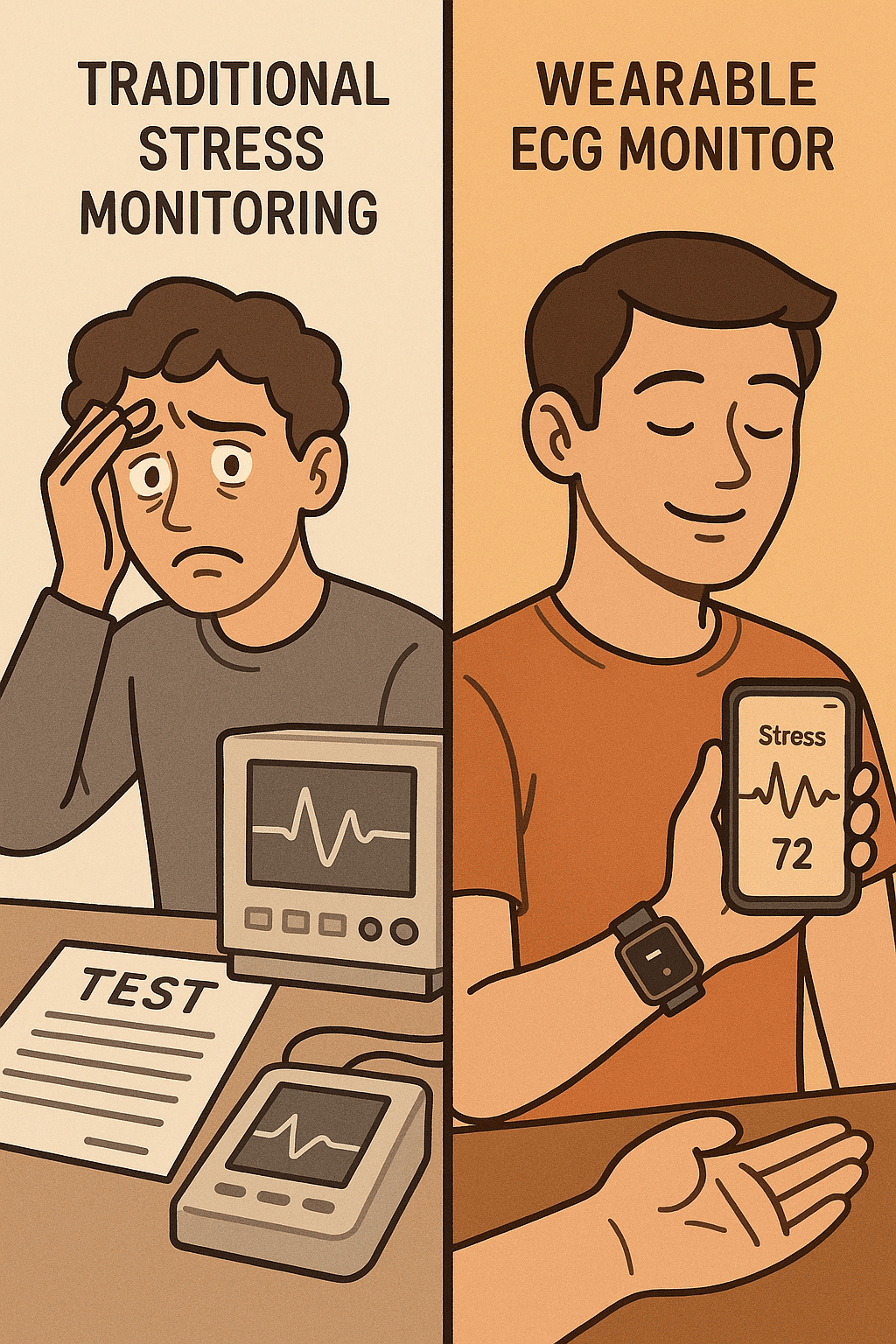
CardioRTHM by Movesense: Real-Time Rhythm Assessment for Heart and Stress Health
If you want a wearable ECG monitor that combines reliability with ease of use, CardioRTHM by Movesense offers a fantastic solution. Its compact sensor and sturdy chest strap work together to capture accurate ECG and heart rate data continuously.
Features include:
- Real-time heart rhythm tracking with mobile app visualization.
- Data storage and sharing capabilities for personal tracking or professional review.
- Support for both short-term and long-term cardiac health assessments.
Priced at around €349.90, it’s a solid investment for wellness enthusiasts looking for precision and long-term utility.
Learn more at: movesense.com
P-CARDIO Devices: High-Resolution Data for Extended Stress and Cardiac Monitoring
For deeper cardiac data, P-CARDIO offers a range of wearable monitors tailored for extended and high-resolution ECG recording:
- HP201: 1-Lead ECG plus respiration and motion sensors for over 5 days of recording.
- HP202: 6-Lead ECG with motion sensing, offering more comprehensive heart mapping.
- HP208: 12-Lead ECG prototype model for near-clinical cardiac analysis.
These devices connect via BLE 5.2, ensuring wireless ease. Though on the advanced spectrum, they’re ideal for those serious about continuous heart monitoring and research-grade stress tracking.
Discover more: pcardiowearables.com
Wellue DuoEK™ Portable ECG Monitor: AI-Powered Insights On-the-Go
If portability and AI analysis appeal to you, the Wellue DuoEK™ is a versatile choice. It supports both handheld ECG capture and wearable monitoring, with recordings ranging from 30 seconds to 15 minutes.
Key points:
- AI-powered app interpretation for quick heart health feedback.
- Built-in memory and rechargeable battery for convenience.
- Multiple purchasing options ranging around $99–€99.
This device is practical for frequent stress monitoring, especially for anyone who wants to pair heart data with mindfulness or relaxation practices on the fly.
Shop at: shop.spirocco.com
Frontier X2 Smart Heart Monitor: Continuous ECG with Real-Time Alerts
The Frontier X2 excels in continuous ECG monitoring while providing actionable stress and heart health information. Key features:
- 24/7 ECG measurements with water-resistant design suited for active lifestyles.
- Real-time vibration alerts to notify stress events or abnormal rhythms.
- Heart rate variability, strain, breathing rate, and training load metrics.
- Compatibility with popular fitness platforms (Apple, Garmin, Zwift).
Ideal for wellness enthusiasts eager to combine fitness, heart health, and stress management in one device.
Available via: amazon.com
Welch Allyn TAGecg™ Wearable ECG Sensor: Clinical-Grade Arrhythmia Detection
For those who prioritize clinical accuracy and professional arrhythmia detection, the Welch Allyn TAGecg™ wearable sensor is a top-tier option. It’s discreet, water-resistant, and supports up to seven days of continuous data collection.
Highlights:
- Proprietary algorithm with >98% accuracy detecting atrial fibrillation and flutter.
- Comfortable single-lead design supporting patient compliance.
- In-office analysis streamlines diagnosis without third-party dependency.
While geared toward healthcare providers, wellness enthusiasts linked to professional care teams may benefit from its advanced capabilities.
More info: hillrom.fr
How Wearable ECG Monitors Integrate with Wellness and Mindfulness Practices
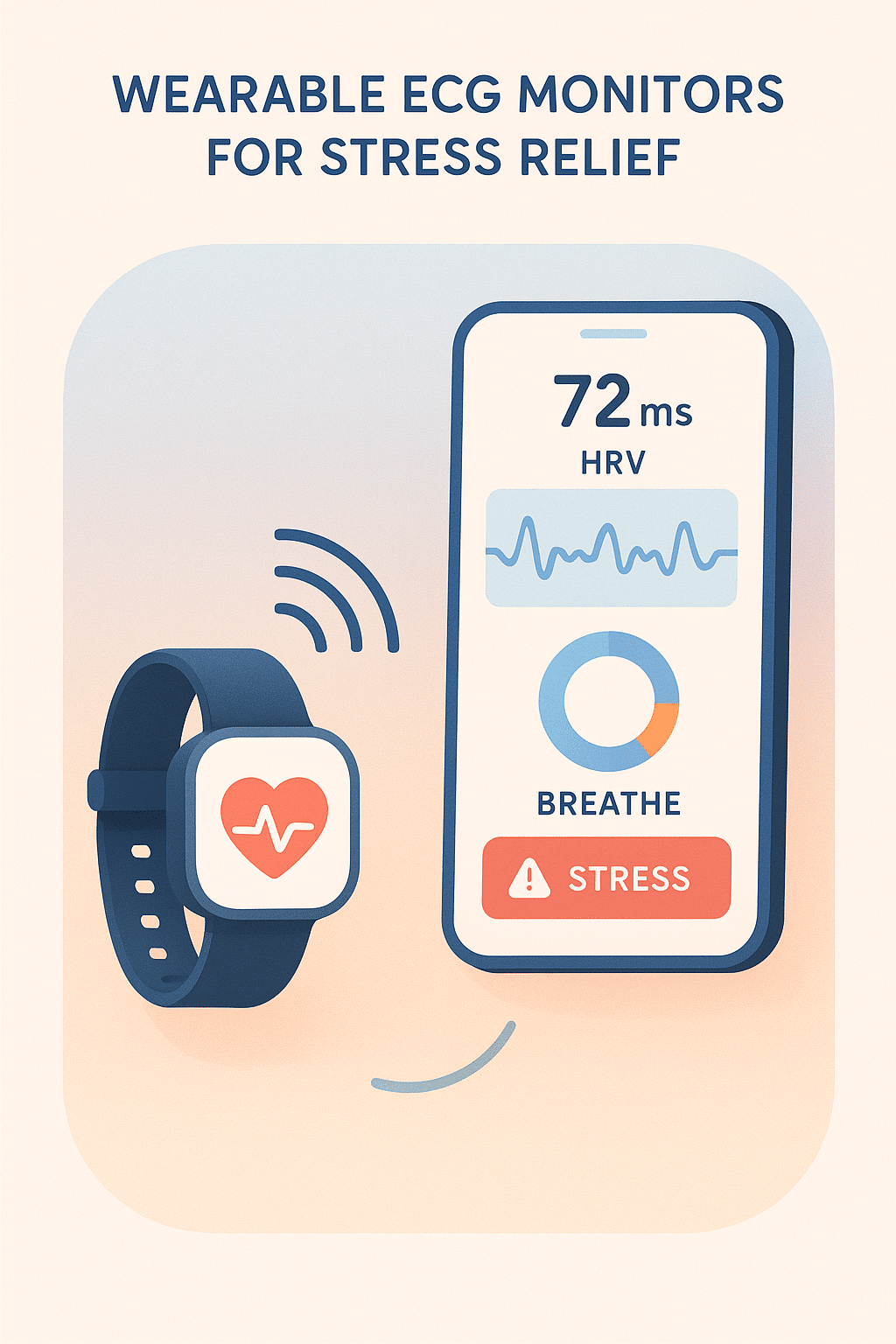
Leveraging Heart Data for Meditation and Relaxation Apps
A huge advantage of wearable ECG technology lies in its integration with meditation and mindfulness apps. By syncing real-time heart rate and HRV data, these apps guide users to optimal breathing, mindfulness, or relaxation exercises tailored to their physiological state.
For example, when your wearable ECG shows low HRV or elevated heart rate, a prompted meditation session or guided breathing exercise can be initiated. This biofeedback loop strengthens emotional regulation and stress resilience.
Apps like those compatible with CardioRTHM or Wellue monitors often include in-app coaching that adjusts dynamically based on your heart activity, fostering deeper relaxation and better anxiety management.
Using Wearable ECG Data to Improve Sleep, Recovery, and Daily Balance
Sleep and recovery form the foundation of stress resilience, and wearable ECG monitors can track cardiac patterns during sleep cycles, revealing signs of stress-related disruptions.
By analyzing nighttime ECG trends, devices like Frontier X2 help identify stress or poor recovery periods, encouraging wellness-focused individuals to adjust lifestyle choices—like sleep hygiene or daytime relaxation—to regain balance.
This data creates a feedback system where you learn the impact of daily habits on heart health, enabling more mindful living and sustained emotional well-being.
Connectivity and Data Sharing: Bluetooth and Mobile Integration
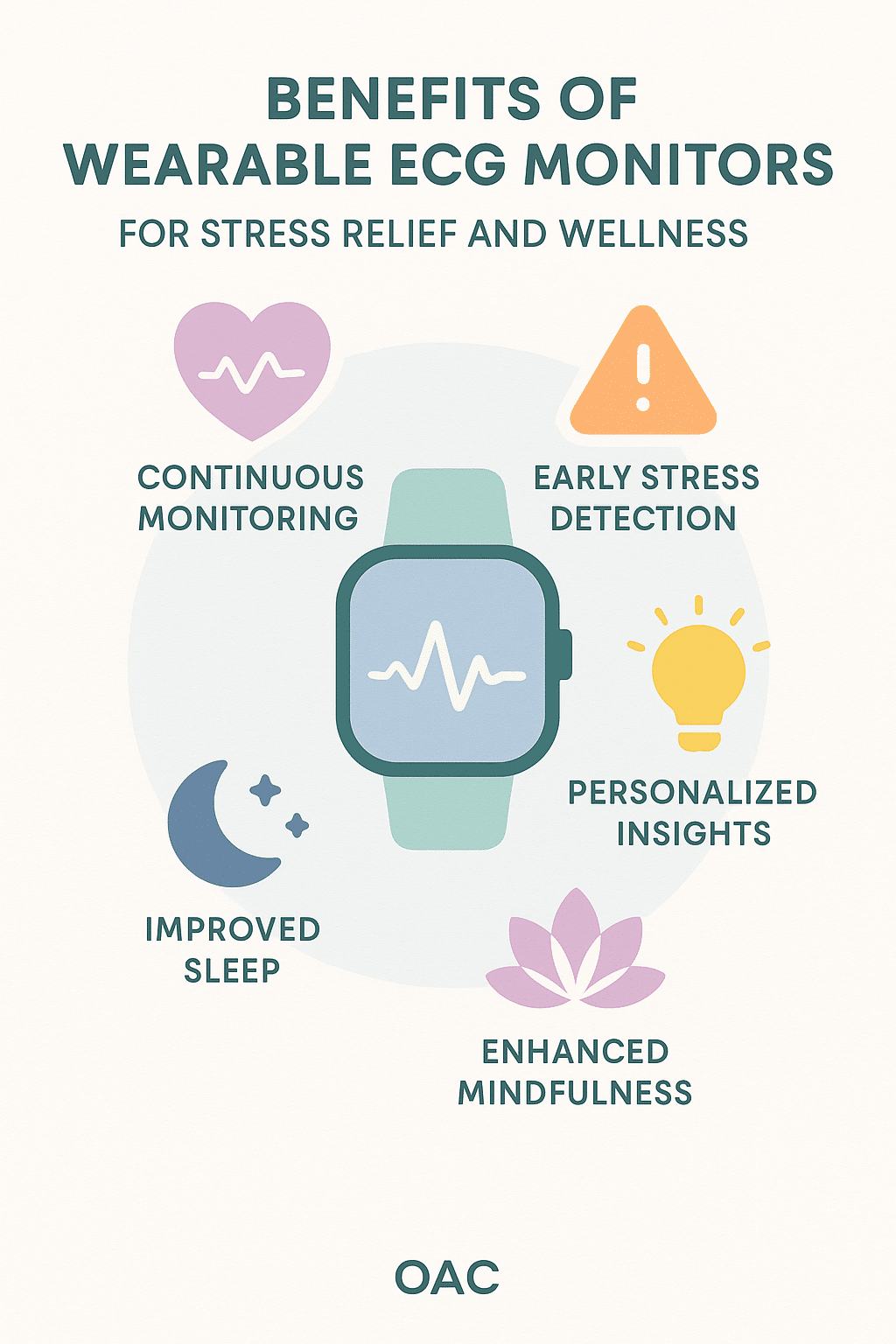
Bluetooth Low Energy and Wireless Features Enabling Seamless Wellness Tracking
Most wearable ECG monitors now support Bluetooth Low Energy (BLE) connectivity, which ensures continuous wireless data transfer to your smartphone or other devices without draining battery life.
This seamless connection provides real-time monitoring, graph visualizations, and instantaneous alerts accessible anywhere. Products such as P-CARDIO’s HP series and Frontier X2 leverage the latest BLE standards like 5.2 to enhance data reliability and range.
Secure Data Sharing with Healthcare Providers and Wellness Communities
Wellness isn’t just personal—it’s social and medical too. Wearable ECG devices often support secure data sharing with healthcare providers, enabling collaborative care for stress or cardiac conditions.
Some apps let you export ECG and HRV data directly or share it live during consultations, potentially revealing stress-driven arrhythmia episodes. Communities of wellness-focused users also benefit by sharing anonymized data, gaining support, and learning stress management strategies collectively.
Security protocols employed by brands like Movesense and Wellue ensure your sensitive health data remains private and HIPAA-compliant, preserving trust as you embrace connected wellness.
Understanding AI and Algorithms Behind Stress Insights in ECG Wearables
How AI Enhances Detection of Stress Markers and Arrhythmias
Artificial intelligence (AI) is reshaping the landscape of wearable ECG monitoring by providing automated, high-accuracy analysis of heart data. AI algorithms detect subtle changes in heart rate and rhythm patterns that often escape human observation, identifying early signs of stress, anxiety, or arrhythmia.
The Wellue DuoEK™, for example, utilizes AI to provide instant ECG interpretation, flagging potential irregularities and offering personalized stress insights. This enhances user empowerment by making complex cardiac data understandable and actionable.
Personalized Notifications and Recommendations for Stress Reduction
Beyond detection, AI-driven wearables deliver customized notifications and lifestyle recommendations rooted in your unique cardiac data trends. These tailored insights help you prioritize stress reduction through personalized relaxation techniques, activity adjustments, or consultations.
Such proactive guidance transforms wearable ECG monitors into personal wellness coaches—turning raw heart data into meaningful steps for emotional balance and improved quality of life.
Practical Tips for Choosing the Best Wearable ECG Monitor for Stress Management
Factors to Consider: Comfort, Battery Life, and Data Accuracy
When selecting a wearable ECG monitor:
- Comfort: Prioritize lightweight, skin-friendly materials, especially if you plan continuous wear (e.g., Movesense MD Sensor with chest strap or wrist-based Frontier X2).
- Battery Life: Longer battery life equals uninterrupted monitoring during work, sleep, and exercise. Some devices offer days of continuous use; others need daily charging.
- Data Accuracy: Devices with FDA clearance or clinical-grade algorithms provide reliable stress and arrhythmia monitoring.
- Connectivity: Bluetooth Low Energy and app compatibility ensure you get real-time data and cloud storage options.
Pricing and Availability of Leading Products
Pricing varies widely:
- Wellue DuoEK™: Around $99–€99, suitable for budget-conscious users wanting AI-driven insights.
- CardioRTHM by Movesense: Priced at €349.90, offering a blend of clinical-grade data and usability.
- Frontier X2: Higher-end at $280–$480, designed for athletes and serious wellness seekers.
- P-CARDIO devices: Typically for research or medical markets; pricing upon request.
- Welch Allyn TAGecg™: Premium clinical tool costing over $1,000 for multi-day monitoring.
Most items can be found via official brand stores, Amazon, or select medical suppliers, with shipping times and regional availability to consider.
Maintaining a Balanced Lifestyle with Wearable ECG Data
Interpreting Your ECG Insights to Reduce Anxiety and Enhance Emotional Well-Being
Understanding your wearable-generated heart data empowers you to catch stress signals early. Regularly reviewing HRV trends, arrhythmia episodes, or stress markers enables you to proactively apply relaxation techniques before anxiety escalates.
Complementing this with journals or wellness apps enhances your self-awareness and emotional regulation—turning data into mindful action.
Combining Wearable ECG Use with Stress-Relief Activities for Sustainable Results
Integrate your ECG monitor usage with:
- Daily mindfulness meditation sessions guided by heart data.
- Breathing exercises timed with heart rate patterns.
- Physical activity and recovery plans informed by strain and HRV metrics.
- Sleep optimization based on nighttime heart rhythms.
This holistic combination builds resilience, reduces chronic stress effects, and supports a calm, balanced lifestyle.
The Future of Wearable ECG Technology in Wellness and Stress Management
Emerging Trends: Multi-Sensor Integration and Advanced AI Analytics
The coming wave of wearable ECG monitors promises integration with other sensors—like respiration, skin temperature, and motion for 360° health views. Enhanced AI will deliver even more personalized, predictive stress and cardiac health insights.
We’ll likely see smarter, smaller devices with improved battery life, interfacing effortlessly with wellness ecosystems and telehealth platforms.
Expanding Accessibility and Affordability for Wellness Enthusiasts
As technology advances and competition grows, prices will become more accessible without compromising quality. This democratization will empower more people worldwide to embrace wearable ECG monitors as everyday wellness tools.
Companies are also focusing on user-friendly design and diverse applications, ensuring that wearable ECG technology is approachable for all, not just experts or patients.
FAQs About Wearable ECG Monitors for Stress Relief
Q1: Can wearable ECG monitors help manage anxiety and stress?
Absolutely. By continuously tracking heart rate variability and detecting stress-related arrhythmias, these devices provide biofeedback and real-time alerts to guide relaxation practices and reduce anxiety.
Q2: What is the difference between single-lead and multi-lead wearable ECG devices?
Single-lead monitors provide basic heart rhythm and HRV data suitable for wellness and stress management. Multi-lead devices offer detailed cardiac data more aligned with clinical diagnostics and research.
Q3: How do wearable ECG monitors integrate with mindfulness and meditation apps?
They sync real-time heart data, especially HRV, enabling apps to deliver personalized breathing or meditation exercises that adapt to your current stress levels for effective relaxation.
Q4: Are AI-powered ECG monitors more accurate for stress insights?
Yes. AI algorithms analyze complex ECG patterns quickly and accurately, detecting subtle stress markers and rhythm irregularities that enhance personalized stress reduction guidance.
Q5: What should I look for when buying a wearable ECG monitor for stress management?
Focus on comfort, data accuracy, battery life, Bluetooth connectivity, app ecosystem, and pricing. Devices like CardioRTHM and Wellue DuoEK™ balance these features well for most wellness pursuits.
Quick Takeaways
- Wearable ECG monitors provide continuous, non-invasive heart rhythm tracking crucial for stress management.
- Heart Rate Variability (HRV) is a key metric indicating emotional balance and resilience to stress.
- Real-time biofeedback from wearable ECGs enables immediate anxiety management and relaxation.
- Leading products like CardioRTHM, P-CARDIO, Wellue DuoEK™, Frontier X2, and Welch Allyn TAGecg™ cater to various wellness needs.
- Bluetooth connectivity and AI analytics enhance data access, sharing, and personalized stress insights.
- Choosing the right device depends on comfort, battery, accuracy, price, and intended use.
- Integrate ECG monitoring with mindfulness, sleep, and activity tracking for holistic stress relief.
Conclusion
Embracing wearable ECG monitors as part of your wellness and stress relief toolkit opens up unprecedented pathways to understanding your heart—and by extension, your body and mind. These devices turn complex cardiac data into empowering biofeedback, reminding you to breathe deeper, slow down, and tune into your emotional balance when stress threatens to overwhelm.
From real-time alerts that catch stress spikes to AI-driven insights that make sense of your heart’s rhythm, wearable ECG monitors create a direct connection between technology and personal well-being. Incorporating products like CardioRTHM by Movesense, Wellue DuoEK™, or the Frontier X2 smart heart monitor allows you to track, interpret, and actively manage stress, anxiety, and recovery more effectively than ever before.
So, if you’re a wellness-focused individual seeking balance and stress relief, integrating a wearable ECG monitor could be your next best step. Start by choosing a device that fits your lifestyle and trust the science-driven technology guiding you toward a calmer, healthier life. Your heart—and mind—will thank you!

